Advertisement
'I Finally Did It': Homeless For Years, Lenny Gets A Home
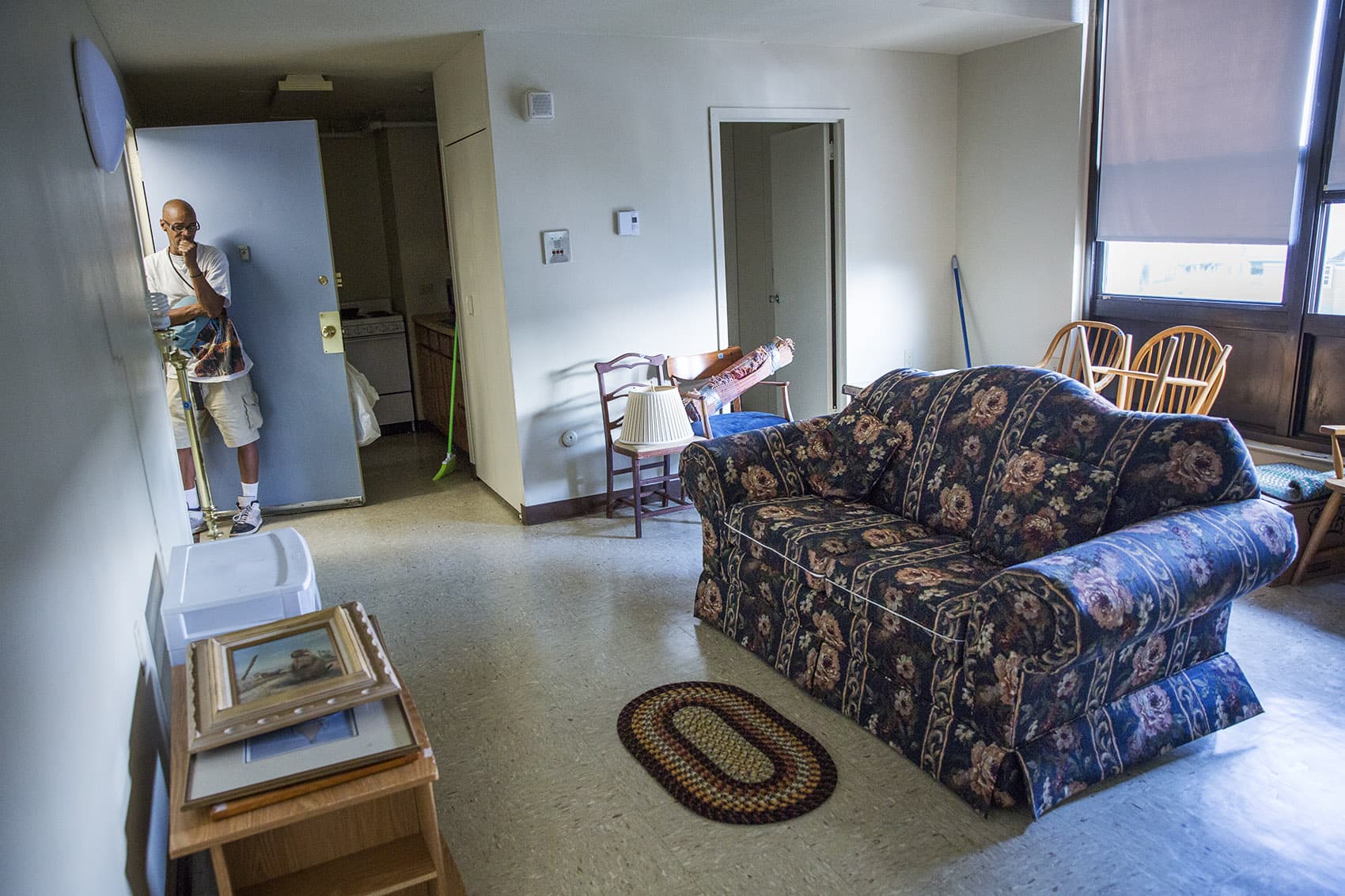
"All right, so we have a unit. It is an elevator building."
Those are words Lenny Higginbottom has waited decades to hear: his own place to call home. The room full of people around him erupts in applause.
"About to cry!" Higginbottom exclaims. Tears well up in the eyes of the tall, lanky 52-year-old, while he also laughs his signature raspy chuckle.
"It's so meaningful — he's getting housed. This is so great," says a giggling Stephanie Brown, one of the advocates from the homeless services agency Pine Street Inn who encouraged Higginbottom to come to this June "housing surge."
The city of Boston has hosted eight such events since 2015, bringing together homeless advocates and government agencies to help homeless individuals get screened for services, sign up for criminal background checks, obtain housing assistance vouchers, and sometimes even find an apartment. At this event, the Boston Housing Authority has 56 apartments set aside for people who've been chronically homeless.
Currently, approximately 1,500 people stay in Boston's emergency shelters on any given night. More sleep on the streets. About 30 percent of them are considered chronically homeless. City workers and homeless advocates are trying to tackle the problem one person at a time, with the goal of ending chronic homelessness in Boston by the end of 2018. They're trying to do it by quickly moving people into housing with support services.
Mid-June: 'A Blessing Like This'
Higginbottom had been trying for the past year to find an apartment. He even had a Section 8 rental assistance voucher to present to private landlords.
"And for whatever reasons, for things from his past, they just kept resurfacing. Landlords wouldn't rent to him because of his past criminal history," says Brown. "He's really turned it around. He's been doing all that he can to prove that, like, 'That's in the past. I'm somebody different. ' "
Except for the short time he was married to his third wife and they rented an apartment in her name, Higginbottom hasn't had a home for about 24 years.
"In and out of jail, hanging out on the streets, having what I thought was fun," he recalls. "But all that time flies by, then when you really knuckle down and just put in the footwork, you can get to this point when you receive something like this — a blessing like this — it's pretty good. I finally did it."
The week after receiving the good news, Higginbottom gets to see the apartment that's been held for him. It's in a BHA building in Roxbury.
"It's beautiful. It's a lot of room," Higginbottom says as he walks into the apartment for the first time.
The unit is just 378 square feet. But that's a lot of personal space for someone who's used to living in crowded shelters and tiny prison cells. Higginbottom did several stints behind bars on drug charges.
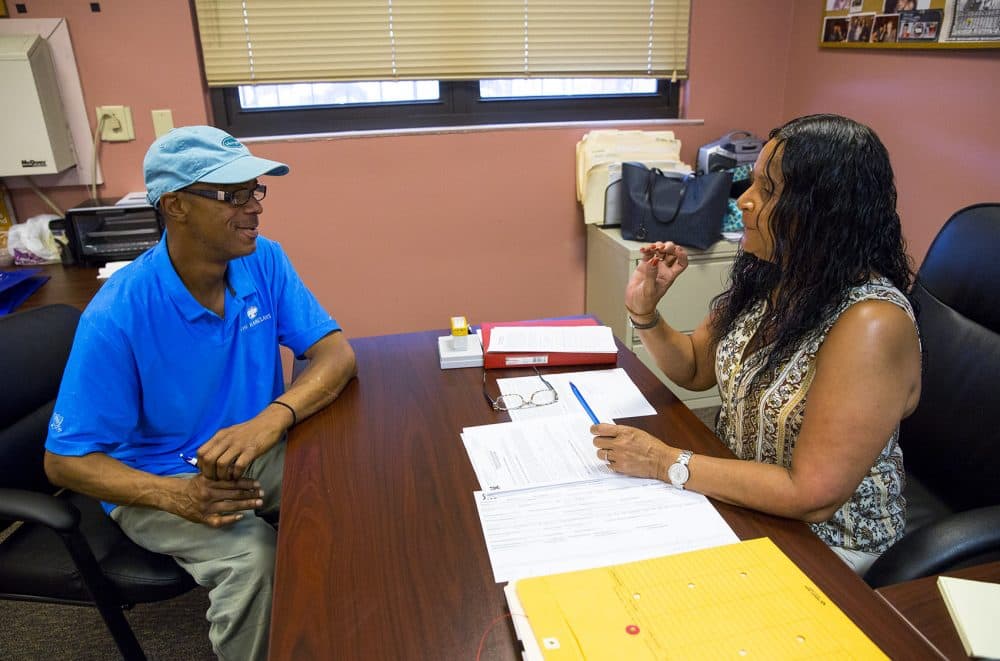
Here, in the studio apartment, there are some surprises.
"What? A bathtub? You ain't seen these in a thousand years!" Higginbottom says to Carmen Figueroa, the property manager who's showing him around.
"So you like it?" Figueroa asks. "Are you saying yes to the apartment?"
"Yes I am," Higginbottom answers.
"Welcome to Amory Street, Mr. Higginbottom," Figueroa says.
Higginbottom says chills are going through him.
"It's a good feeling. If I would have gave up, I wouldn't be standing here now," he says. "If I would have listened to people, or believed the people that are saying this couldn't happen ... once again, I wouldn't be here now."
'I Was The Headache'
Higginbottom's experience with homelessness began when his second wife kicked him out, dropping him off at a homeless shelter. He had no place else to go, and no money or job.
He's the first to acknowledge his part in the way his life went. He admits he wasn't a good husband.
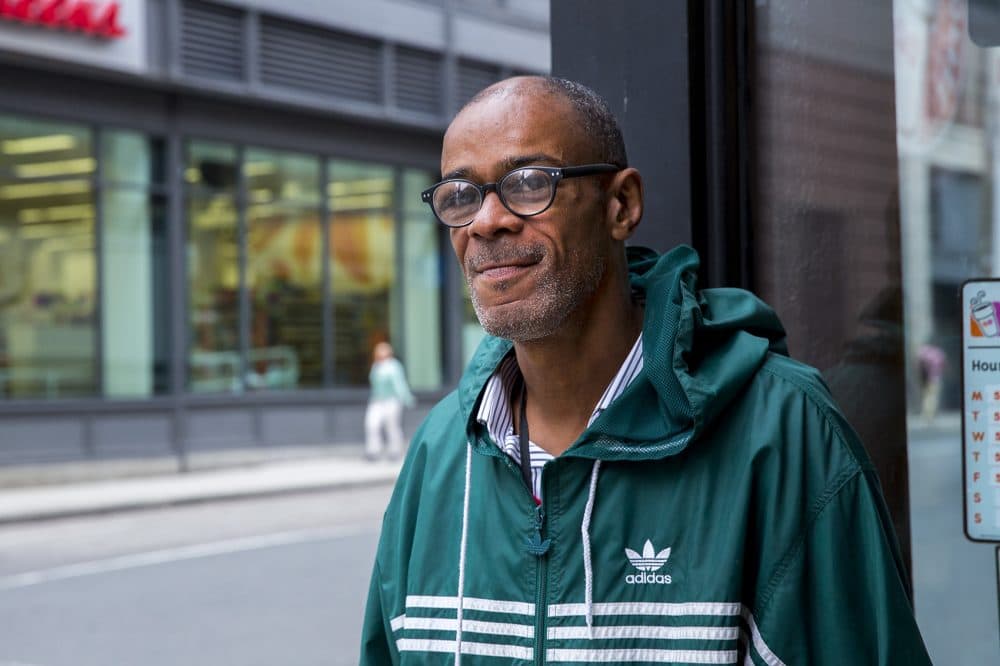
"I was the headache. I was the idiot. I was the knucklehead," he says.
He says he just didn't care much about anything at that point in his life. But it wasn't all his doing, or in his control.
He knew from a young age, after his father died when he was 6, that something wasn't right in his mind, he explains. He didn't know then that it was called mental illness.
Higginbottom dropped out of school in ninth grade. He worked as a home health aide and on a hotel banquet staff. Around age 20, he got married for the first time.
And he was writing and recording rap music. Higginbottom says his rap group got some radio play and even did a few shows at the Apollo Theater.
But also around that time, he started smoking crack cocaine. He became addicted. He knew the danger of drugs; his group even rapped about it.
"When I listen to [the songs] today, we were visionaries," he says, "because we explained about the drugs and what people would turn into, how people would turn their back on you and try to be your friends, and actually really tricking you."
Late June: Moving In
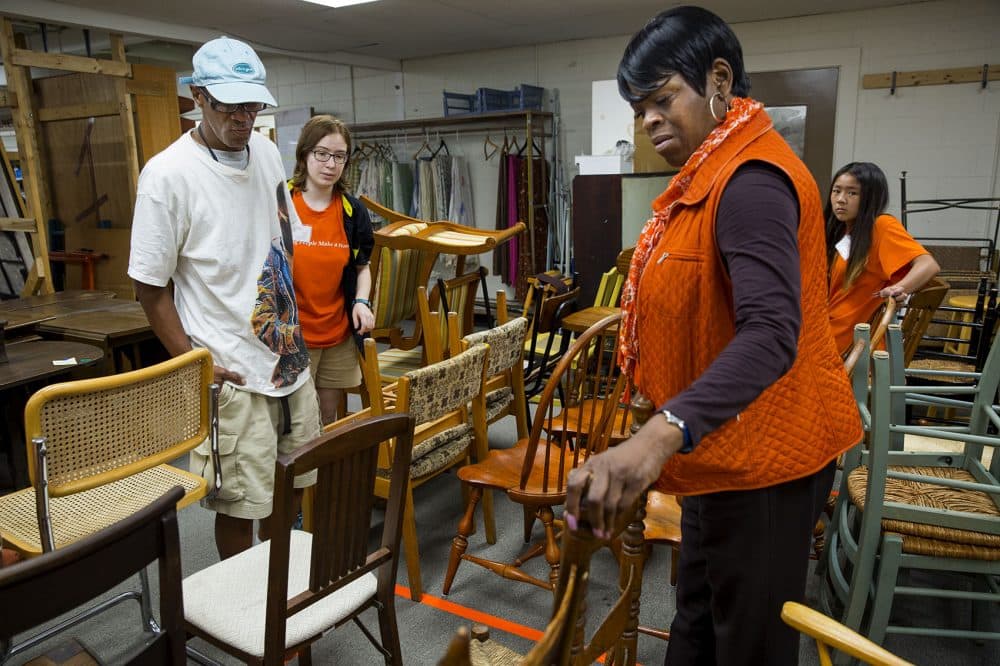
It's move-in day — almost a quarter century after Higginbottom first became homeless.
His mental health is stable. He says he uses talk therapy, relaxation techniques and psychiatric medication to control depression and bipolar disorder. He also says his addiction is under control. He gets Supplemental Security Income because of disc problems in his back, sciatica and other physical conditions.
Now, he needs to get some things. Namely, everything to furnish an apartment.
He and Retha Watson, a housing placement specialist from Pine Street Inn, are at a big warehouse in Acton run by the nonprofit Household Goods. It's like a home store, full of donated items that are free for people in need.
They pick out a small couch, mattress, box spring and bed frame, kitchen table and chairs, framed artwork, a television, linens, lamps and kitchenware.
Movers hired by Pine Street Inn haul all of the stuff to Higginbottom's new apartment the same afternoon. He immediately unpacks and sets everything up.
Higginbottom has already been sleeping on the floor here for a week. Once he had the apartment, he didn't want to leave. He cleaned it, scrubbing the floors on his hands and knees.
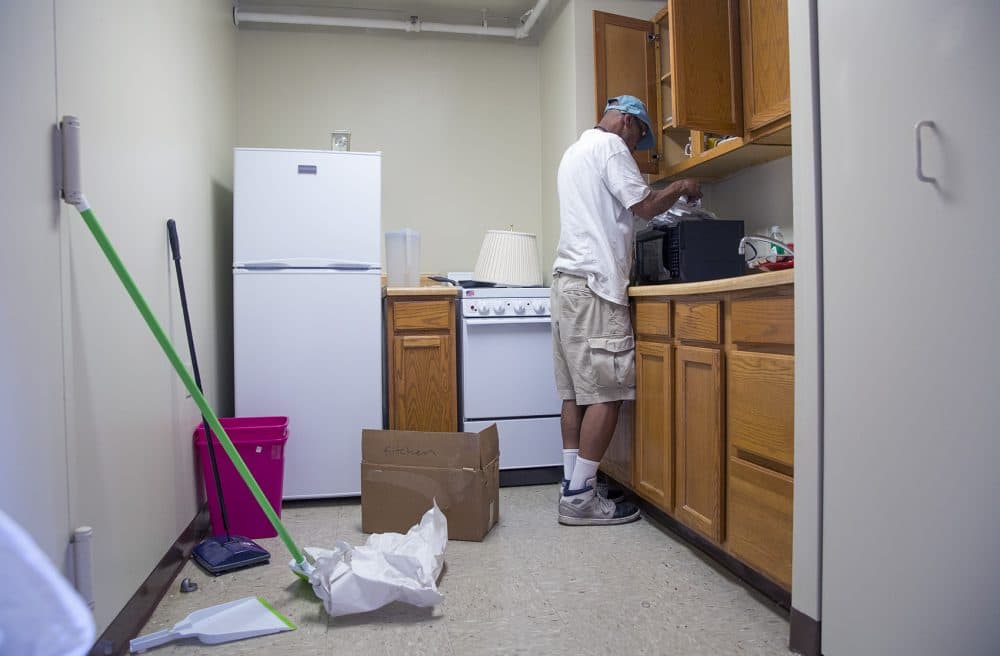
Now he needs to do everything in his power to keep his home.
"It's so true how, you know, the real work starts now," Watson tells him.
"Yeah, now I can flow a little bit more, with more energy and more stabilizing," Higginbottom responds. "Now I'll really be more focused."
Watson will be here for him, checking in by phone and in person a couple times a week.
"Whatever his needs are — if he needs help with budgeting, just really getting adjusted," Watson says. "And to really know, like, he's not by himself, he has people that's willing to help him."
Higginbottom says he turns to a higher power for help, too. He's so grateful for getting to this point that he stops and thanks God before walking out the door of his new home.
"I ask you, bless the whole building and everything in it. Bless all the staff workers and providers so they have the strength to get more of us off the streets."
Late-July To Mid-October: New — And Old — Routines
A month after moving in, one of the things Higginbottom is enjoying the most about having an apartment is cooking.
He's heating up some soup he made the other day. It's chock full of vegetables, beans, meat and pasta. Some friends have come over for homemade Italian food.
"Pasta shells first. Did the little pasta, made the sauce," Higginbottom says.
He wants to get into baking and make sweet potato pie, like his mother used to make.
Higginbottom is feeling a lot less stress than he did in his old life.
"It's peaceful. It's nice and quiet and relaxing."
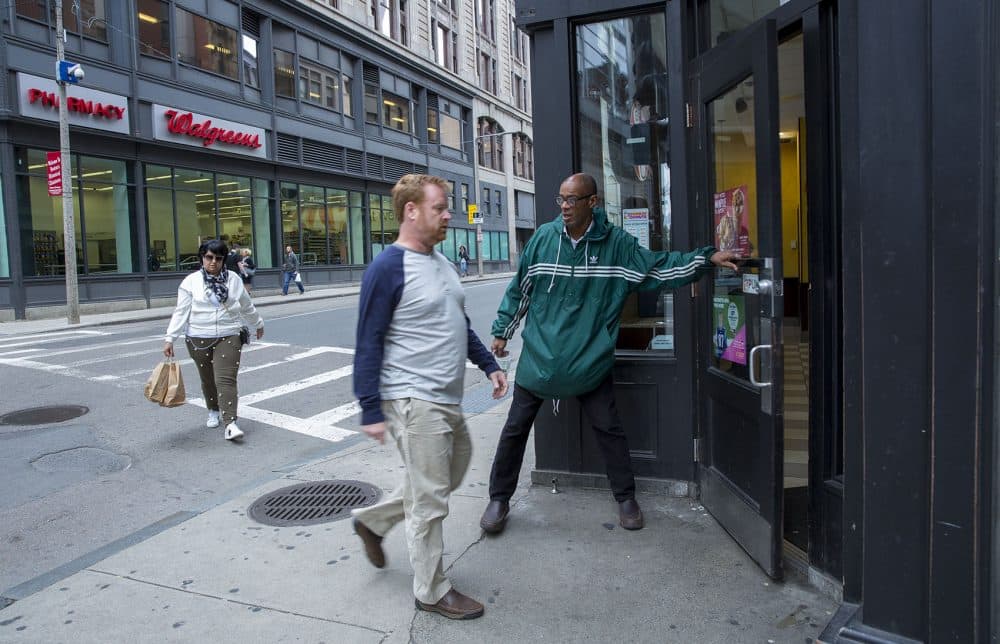
He says he spends time praying and meditating. But sometimes he needs to escape the quiet of being alone in his apartment. Higginbottom is very much a people person. In the homeless shelters and prisons where he spent time, there were always other people around.
That's one reason he hasn't left all of his old life behind. On any given day, you'll find him somewhere in downtown Boston — like outside the Dunkin' Donuts at Washington and Boylston streets — panhandling.
"Morning. How's it going? If you can [give] on the way out. ... Have a good one," Higginbottom says to people, shaking a plastic cup of change and dollar bills as he opens the Dunkin' Donuts door for them.
Higginbottom says if he stopped panhandling, he'd miss it.
"Because I've networked with a lot of good people down here — professors, lawyers, doctors, business owners. And they all, you know, gave me a lot of advice," he explains.
He says some of those people were like mentors, advising and encouraging him on ways to keep improving his life and trying to get out of homelessness.
There are plenty of rude people who pass by on the street, though, too, Higginbottom says. So panhandling is hard — kind of like a job.
To those who might not understand why he still asks strangers for money now that he has a home, Higginbottom says after paying his $211 rent and buying necessities such as food, he can't get by on the $753 he receives in SSI benefits.
On this day, he makes about $20 panhandling -- money to take the T or bus, or to get something he needs for his apartment, he says.
Sharing His Success
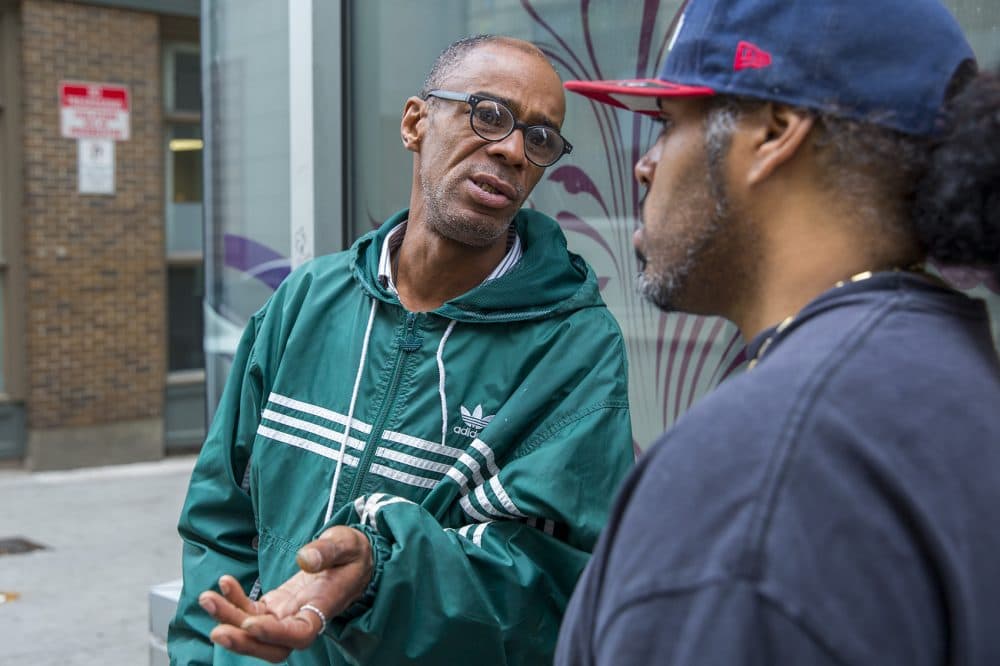
But that's just a short part of the morning. Higginbottom's next stop is less than a block away, at St. Francis House.
He spent countless days in this shelter. It seems just about everyone here knows him.
"Lenny!" a man yells from the back of the atrium.
"What's going on, everybody?" Higginbottom responds.
He comes back here several times a week. He mingles — sharing his story with people at the shelter, telling them about programs they can get into, and encouraging them to believe they, too, can break out of homelessness.
"You're hanging in there ... you just keep going on," Higginbottom says to 47-year-old Eric Leone, who's eating lunch in the cafeteria. "The gold pot is right there — before you get to the rainbow it'll be set right there."
"Oh, you got that right," Leone replies.
"Stay strong. You keep on that blueprint you're using now," Higginbottom says.
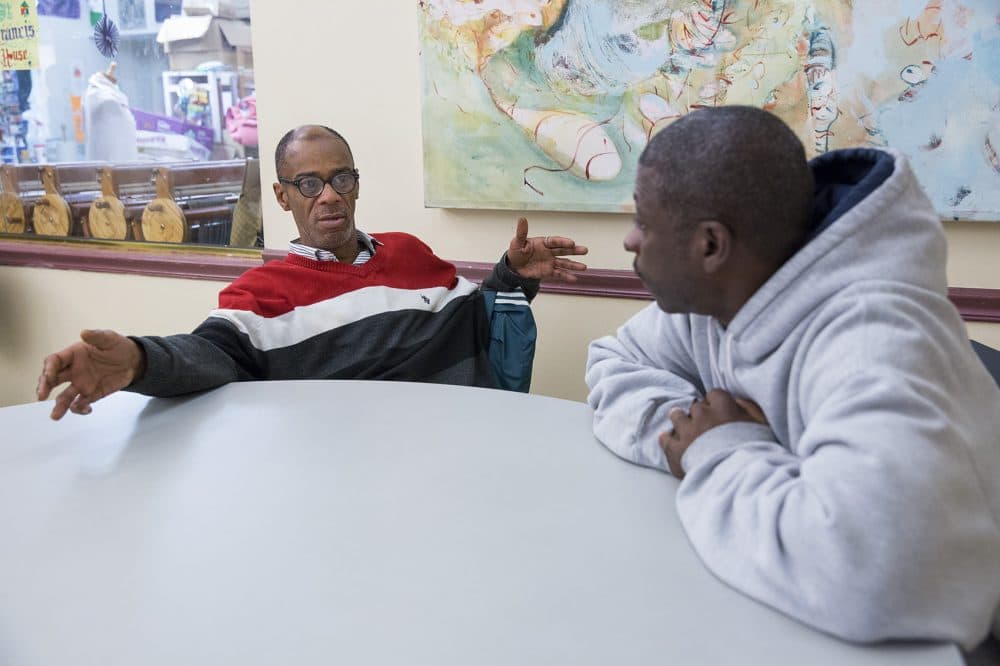
Even though he holds no official position, he calls this his "advocacy" or "outreach" work. He volunteered with the Boston Homeless Solidarity Committee after the city shut down homeless and addiction programs on Long Island in 2014. He has organized cookouts in a Roxbury park for people who are homeless. The advocacy work clearly fuels him.
"Lenny was giving back before he had a lot to give back," says St. Francis House President and CEO Karen LaFrazia. She's known Higginbottom for all of the 20 years she's worked here.
"To have an authentic voice like Lenny, and to know his struggles and then to see him come out on the other side, with a place to live, it's a different kind of hope that you can give some people," LaFrazia reflects. "And what happens for so many of our guests is that they've lost hope."
Remembering His Past, Looking To The Future
Higginbottom's hope waned at times over the years. He says there was always some barrier to overcome or red tape to clear in his effort to turn around his life.
Now, his advocates from Pine Street Inn and Hearth, Inc. check in with him regularly, in phone and in person, helping him with things like securing a cellphone and making sure he keeps up with his medical appointments. He has a "payee" who receives his SSI check and pays his rent, then gives him some cash for expenses and puts money in his saving account.
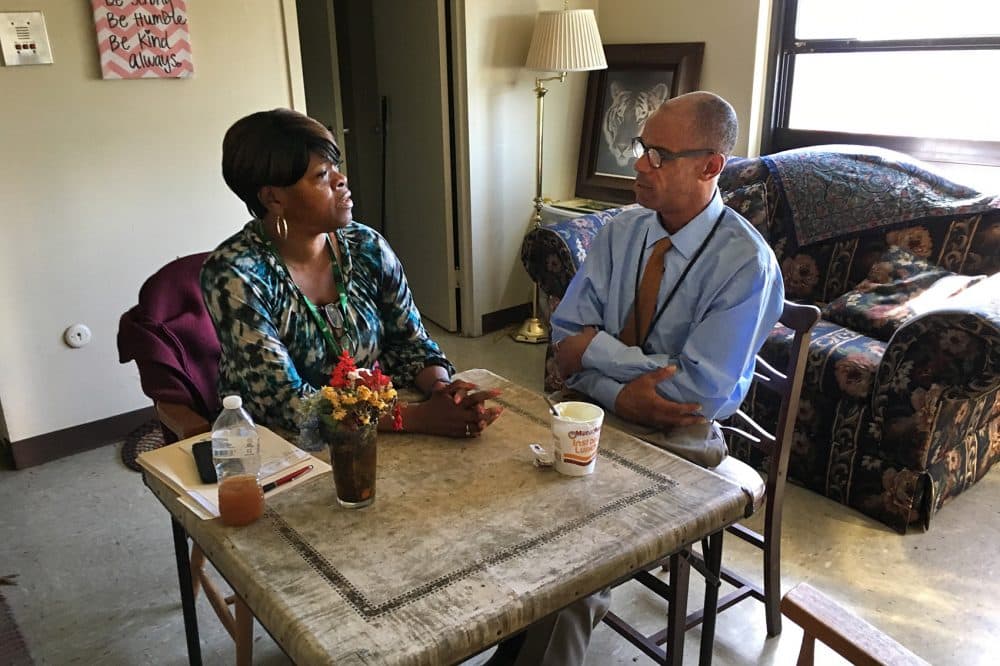
"You're doing excellent. I'm proud of you," Watson, from Pine Street Inn, tells Higginbottom during a meeting at his apartment in October.
She reminds him to stay focused and disciplined. Higginbottom still associates with people who are living on the street, but he says he knows to walk away if he sees something that might "trigger" him to return to his old ways. He acknowledges he still drinks some alcohol and smokes marijuana. He says those never caused a problem for him.
"You have to be real, real careful of your interactions with other people on the street," Watson says. "One bad decision away, [you] can lose everything."
Now that he has a home, Higginbottom's biggest goal is to gain one more thing: relationships with his four children, who range in age from 16 to 31. He wasn't involved in their lives when they were younger but has established limited contact with them in recent years.
"When I wasn't in their life and I was homeless, it was the thoughts of them, to get back to them if I ever get a house," Higginbottom reflects. "So they helped me without being in my life, but they were in my life in my thoughts, my prayers, and in my heart."
His hope shows no limits now.
Correction: An earlier version of this story said Higginbottom spent countless nights at St. Francis House. The facility is actually a day shelter. We regret the error.
This article was originally published on November 16, 2017.

